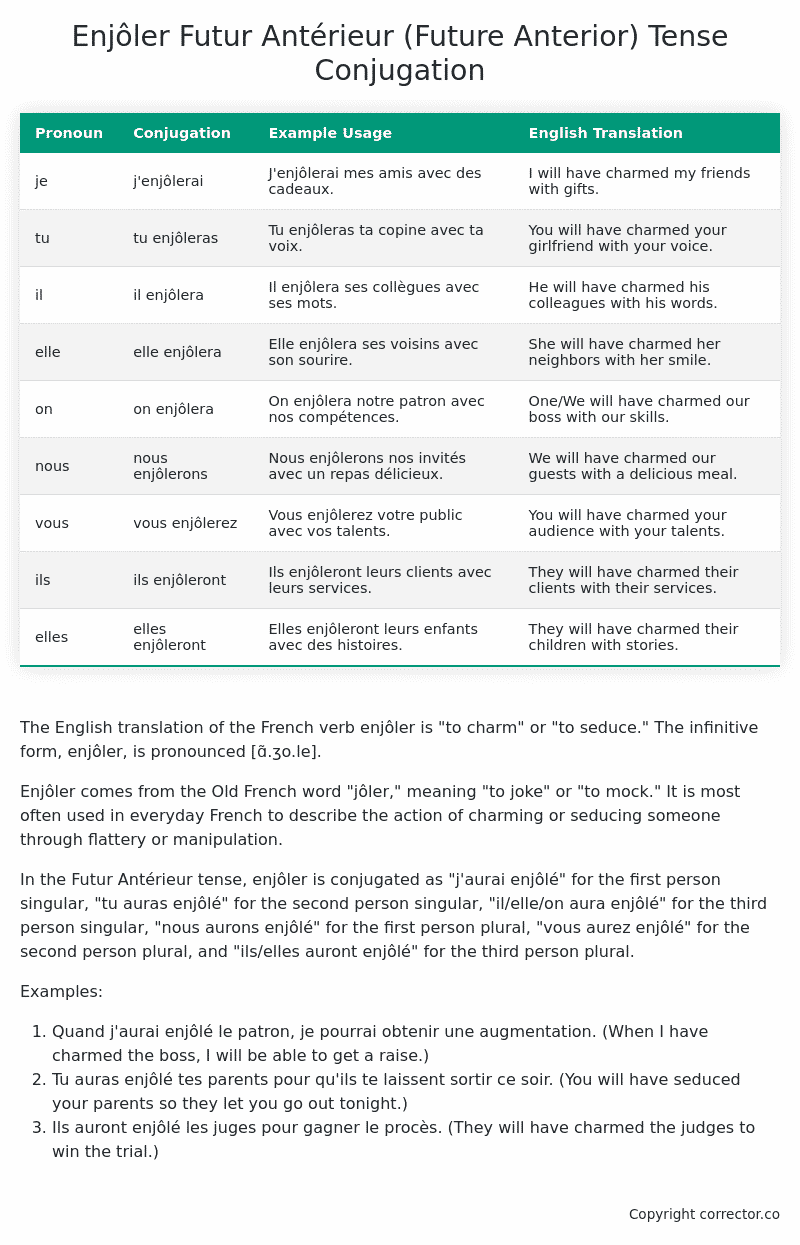Futur Antérieur (Future Anterior) Tense Conjugation of the French Verb enjôler
Introduction to the verb enjôler
The English translation of the French verb enjôler is “to charm” or “to seduce.” The infinitive form, enjôler, is pronounced [ɑ̃.ʒo.le].
Enjôler comes from the Old French word “jôler,” meaning “to joke” or “to mock.” It is most often used in everyday French to describe the action of charming or seducing someone through flattery or manipulation.
In the Futur Antérieur tense, enjôler is conjugated as “j’aurai enjôlé” for the first person singular, “tu auras enjôlé” for the second person singular, “il/elle/on aura enjôlé” for the third person singular, “nous aurons enjôlé” for the first person plural, “vous aurez enjôlé” for the second person plural, and “ils/elles auront enjôlé” for the third person plural.
Examples:
- Quand j’aurai enjôlé le patron, je pourrai obtenir une augmentation. (When I have charmed the boss, I will be able to get a raise.)
- Tu auras enjôlé tes parents pour qu’ils te laissent sortir ce soir. (You will have seduced your parents so they let you go out tonight.)
- Ils auront enjôlé les juges pour gagner le procès. (They will have charmed the judges to win the trial.)
Table of the Futur Antérieur (Future Anterior) Tense Conjugation of enjôler
| Pronoun | Conjugation | Example Usage | English Translation |
|---|---|---|---|
| je | j’enjôlerai | J’enjôlerai mes amis avec des cadeaux. | I will have charmed my friends with gifts. |
| tu | tu enjôleras | Tu enjôleras ta copine avec ta voix. | You will have charmed your girlfriend with your voice. |
| il | il enjôlera | Il enjôlera ses collègues avec ses mots. | He will have charmed his colleagues with his words. |
| elle | elle enjôlera | Elle enjôlera ses voisins avec son sourire. | She will have charmed her neighbors with her smile. |
| on | on enjôlera | On enjôlera notre patron avec nos compétences. | One/We will have charmed our boss with our skills. |
| nous | nous enjôlerons | Nous enjôlerons nos invités avec un repas délicieux. | We will have charmed our guests with a delicious meal. |
| vous | vous enjôlerez | Vous enjôlerez votre public avec vos talents. | You will have charmed your audience with your talents. |
| ils | ils enjôleront | Ils enjôleront leurs clients avec leurs services. | They will have charmed their clients with their services. |
| elles | elles enjôleront | Elles enjôleront leurs enfants avec des histoires. | They will have charmed their children with stories. |
Other Conjugations for Enjôler.
Le Present (Present Tense) Conjugation of the French Verb enjôler
Imparfait (Imperfect) Tense Conjugation of the French Verb enjôler
Passé Simple (Simple Past) Tense Conjugation of the French Verb enjôler
Passé Composé (Present Perfect) Tense Conjugation of the French Verb enjôler
Futur Simple (Simple Future) Tense Conjugation of the French Verb enjôler
Futur Proche (Near Future) Tense Conjugation of the French Verb enjôler
Plus-que-parfait (Pluperfect) Tense Conjugation of the French Verb enjôler
Passé Antérieur (Past Anterior) Tense Conjugation of the French Verb enjôler
Futur Antérieur (Future Anterior) Tense Conjugation of the French Verb enjôler (this article)
Subjonctif Présent (Subjunctive Present) Tense Conjugation of the French Verb enjôler
Subjonctif Passé (Subjunctive Past) Tense Conjugation of the French Verb enjôler
Subjonctif Imparfait (Subjunctive Imperfect) Tense Conjugation of the French Verb enjôler
Subjonctif Plus-que-parfait (Subjunctive Pluperfect) Tense Conjugation of the French Verb enjôler
Conditionnel Présent (Conditional Present) Tense Conjugation of the French Verb enjôler
Conditionnel Passé (Conditional Past) Tense Conjugation of the French Verb enjôler
L’impératif Présent (Imperative Present) Tense Conjugation of the French Verb enjôler
L’infinitif Présent (Infinitive Present) Tense Conjugation of the French Verb enjôler
Struggling with French verbs or the language in general? Why not use our free French Grammar Checker – no registration required!
Get a FREE Download Study Sheet of this Conjugation 🔥
Simply right click the image below, click “save image” and get your free reference for the enjôler Futur Antérieur tense conjugation!

Enjôler – About the French Futur Antérieur (Future Anterior) Tense
Construction
Common Everyday Usage Patterns
Interactions with Other Tenses
For example
Summary
I hope you enjoyed this article on the verb enjôler. Still in a learning mood? Check out another TOTALLY random French verb conjugation!


